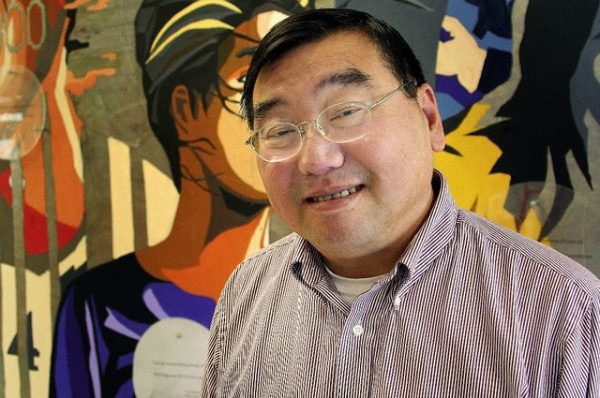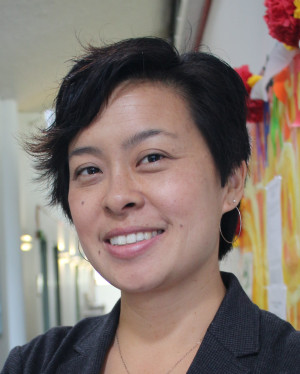By Dr. Dawn Lee Tu
On Monday, March 21st, the field of Asian American Studies suffered a tremendous loss. Don Nakanishi, Professor Emeritus at the UCLA Asian American Studies Center, passed away at the age of 66. Nakanishi was a beloved, respected and pioneering scholar in the field and spent over four decades combined teaching Asian American Studies, providing national leadership in developing and advancing the field of Asian American Studies and Ethnic Relations Scholarship, and serving as the Center Director.
A prolific writer, and influential scholar and teacher, Nakanishi’s faculty profile describes his body of work that includes over 100 articles, books, and reports on Asian Pacific American political and education research. The profile indicates, “He was the first to demonstrate that Asian Americans, despite their high group levels of education and income that are usually associated with active political participation, had very low levels of voter registration and voting.”
Nakanishi’s record of service includes being a former president of the Association of Asian American Studies, a co-founder and publisher of Amerasia Journal that has been publishing Asian American Studies scholarship since 1971, and a co-founder of AAPI Nexus: Asian American and Pacific Islander Policy, Practice, and Community Research. He was appointed by President Bill Clinton to the Civil Liberties Public Education Fund Board of Directors that is credited for the issuing a national apology and issuing reparations for the 120,000 Japanese Americans incarcerated during World War II. Nakanishi served on numerous boards of directors including Poverty and Race Research Action Council, the Simon Wiesenthal Museum of Tolerance, and the Asian American Justice Center.
Nakanishi mentored countless undergraduate and graduate students, and as word spread about his passing, many took to social media to share their sadness for the passing of their mentor and colleague. Dr. Cheryl Matias, Assistant Professor in the School of Education and Human Development at the University of Colorado at Denver, reflected, “Don was a kind of mentor who said few words but felt fully embraced.” Dr. Oiyan Poon, Assistant Professor in Higher Education at Loyola University Chicago, shared how he “masterfully mentored with a fierce heart for social justice and bridge building.”
In a keynote Nakanishi delivered last year at the celebration of 45 years of Asian American Studies at Yale University, he recalls his life journey as “an amazing array of dynamic and significant trends and historic events.” His deep commitment to social justice and community can be traced back to his parents’ experiences during World War II. Nakanishi’s parents and family were incarcerated at Posten, Arizona for more than two years. His parents joined protests over Japanese American imprisonment that landed them a transfer to Tule Lake, where all “troublemakers” were sent. While at Tule Lake, the U.S. bombed Hiroshima and Nakanishi’s paternal grandparents were killed, fueling his parents’ angry and desire to renounce their U.S. citizenship. However, they struggled with their desire to return to Hiroshima but realized that they could not raise their children in their devastated hometown. So his parents settled on raising their two sons in the diverse East Los Angeles community.
Born and raised in Boyle Heights, Nakanishi grew up among Chicanos and whites and had a deep connection to this working class community. His formative years occurred during his time at Roosevelt High School where he was elected student body president by reaching out to students by speaking in English, Japanese, and Spanish in ESL (English as a Second Language) classes. In addition to this experience, Nakanishi was deeply impacted by the East Los Angeles Walkouts where Chicano students protested unequal and culturally insensitive education they were receiving in the LA Unified School District.
With a strong sense of community, Nakanishi left for Yale in 1967. When Pearl Harbor was attacked that on December 7th that year, Nakanishi experienced racist treatment from his classmates and this experience made him realize how little he knew about the history of Japanese Americans. In this turning moment, Nakanishi sought out and discovered his first Asian American Studies book that exposed him to research on anti-Asian racism in the U.S. Nakanishi’s exposure to justice caused him to joined a student group that would later lead him to be a founder of MeChA (Movimiento Estudiantil de Aztlan) at Yale.
After graduating from Yale with a degree in intensive political science, Nakanishi continued onto Harvard with a Ph.D. in political science in 1978. He returned to Los Angeles and began teaching at UCLA.
Nakanishi attracted national attention in the late 1980s during a three-year battle to gain tenure. His supporters accused the university of denying Nakanishi tenure because of racist attitudes towards community-based research. Chancellor Charles Young reversed his decision, following a very public campaign led by a multi-racial coalition of student and community supporters who gathered petition signatures, wrote letters, and advocated on Nakanishi’s behalf. In an LA Times article written by Larry Gordon, Nakanishi said his case “came to symbolize issues of ethnic and intellectual diversity at American campuses.”
Dr. Poon marveled at the number of community activists all over California and California lawmakers in Sacramento who supported Nakanishi’s tenure as “a testament to the power of community organizing and the deep level of respect for Don’s work as a community-engaged scholar dedicated to the bridging the academy and community struggles. Securing his tenure wasn’t just about Don. It was about the development of Asian American Studies and community-research partnerships and collaborations for empowerment.”
Reflecting on Nakanishi’s direct impact, Dr. Alice Hom, Director of the Queer Justice Fund at Asian Americans/Pacific Islanders in Philanthropy, describes her former mentor as a “generous… guiding light for a huge swath of scholars and activists in Asian American Studies and (the) broader community.”
Dr. Daniel D. Liou, Assistant Professor of Educational Leadership and Innovation at Arizona State University, remembers Nakanishi as the “quintessential scholar who lived by his writing, generously provided time and mentorship to his students, and contributed locally to many communities.” Liou describes Nakanishi’s mentorship as having a profound impact on his life and career: “I was one of the last students to benefit from Special Actions that led me to become the first in my family to attend college at UC Berkeley (where) I came across his seminal work in education (The Asian American Experience). He later served as my dissertation co-chair and I was one of (his) very last students. To this day, many of his students embody his vision of education and carry his method of mentorship and community service into other fields and professionals.”
The outpouring of condolences speaks to Nakanishi’s legacy as a scholar and advocate for Asian American Studies.
Nakanishi’s family shared the announcement of his passing:
“We regret to inform you as friends of Don Nakanishi that he passed away this afternoon in Los Angeles. In lieu of flowers, please consider making a contribution to the Don T. Nakanishi Award for Outstanding Engaged Scholarship for Graduate and Undergraduate Students at the UCLA Asian American Studies Center or to the Nakanishi Prize at Yale University. Funeral arrangements are pending and will be shared in the upcoming days.”
Photo credit: UCLA
ABOUT THE AUTHOR: Dr. Dawn Lee Tu is the Director of Asian Pacific American Student Development at UC Berkeley.









